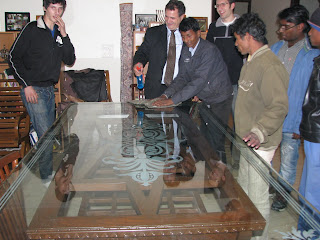Our home life here with fulltime maid assistance is….easy. Every day, Chandana asks what we want her to prepare for dinner; nothing is too exotic or out of reach. Jordan goes through Thai recipe books, identifies something interesting, and gets Sarat (our driver and Chandana’s husband) to assist in translation to Hindi. Chandana derives great joy over our “oohs” and “aahs” for the things she prepares, it is clearly fundamental to her pride and job satisfaction. Dinner is cleared, dishes are washed and put away - -all by Chandana.
I notice that with all the help we receive, our family gets even less likely to do the minor things that should be under our control….putting the tops back on peanut butter jars; returning food to the refrigerator when Chandana isn’t here.
There are frequent discussions with the boys about what we should or should not be doing. I don’t think we will reach consensus, but it is good to just have the conversations and open our minds to these issues.
Here is my view on household help, which I have always had through the years as a working mom with our very dear Cynthia as our babysitter, housekeeper, and my right hand. There was nothing that Cynthia would do that I wouldn’t do. If we were home at the same time – say, preparing for Thanksgiving - then we worked as a team. One washed, one dried; one chopped, one cooked; etc. Household help was there to assist when the amount of work required exceeded the time available, and so extra hands were needed. Household help was there when I had to work and so someone else prepared fresh meals for the family. Household help was there because I was driving two kids to elementary school while another kid needed to be brought to nursery school and another was still a baby at home. And so on. But there was never a sense in my head that “this is my work; that is your work.”
Fast forward to India. Maids here have a much deeper sense of “I will take care of everything, ma’am.” Since the kids are now big, I really don’t need as much help. I am not taking care of a crying baby while someone else handles meal preparation. In fact, I am sitting at my computer typing blog entries while someone else does the dishes. So really, a lot of the help that we have is indulgence. (And it is cheap enough here to indulge in these indulgences.) At home, I would rarely be sitting around the house doing crossword puzzles while someone else cleaned the house or prepared food, but that in fact is what happens here. (Since the maid is in the house for some 50+ hours a week, she will inevitably see you during moments of sloth and leisure - - reading books, going outside to exercise, watching a movie…)
I think we need to still do some *basic* things, like clear the table after we eat. Chandana is happy to do this for us, and my boys are happy to allow her to. Perhaps I feel like it gives more honor to her work to show her that none of it is beneath us.
My boys think that I am sending her strange signals if I get up and start assuming what she sees as her job responsibilities. She takes pride in this work, and I am depriving her of some of this; perhaps even suggesting that she isn’t fast enough or competent enough.
And of course, everyone can short circuit any discussion by simply saying “that isn’t how it is done here; you are imposing your western values on this society and it just doesn’t work….you will create a false set of expectations for any future job she gets…” etc. etc.
Jordan says that I have a fundamental problem in that I probably, at my core, feel guilty about having the luxury of someone doing all this work around us, and she is not living a life that is as comfortable as ours is. And so I try to compensate by working alongside her, and relieving her of some of her labors, and demonstrating by doing the same stuff that none of it is beneath us. (Chandana is not, I am certain, at all sensitive to any of these nuances - - she is happy to work for expats, happy to be in our house, happy with our family that speaks to her with respect.)
But by compensating for *my* guilt, they say, I can make it worse for everyone else in the household, since everyone else is perfectly happy having someone pick up things that they drop and clear the table for them after they eat. But I will end up setting a different job standard, and Chandana will assume that this isn’t one of the roles we expect from her. And so I need to get up and leave the table uncleared, for the good of the rest.
I muse about why it is different in your own house (for example) as opposed to being on the outside. I am not so guilt-ridden that I get up and help the waiter clear the table in a restaurant; so why is it different in one’s own house? But somehow, it feels different…maybe it’s just decades of conditioning.









